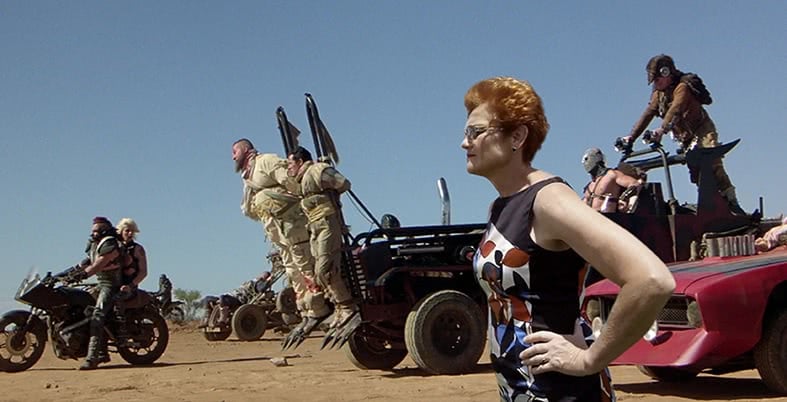Terror Nullius is a visual anthem for our racist, decaying nation

Earlier this year, TERROR NULLIUS, a sample-based feature from artist collective Soda_Jerk, was deemed fundamentally “un-Australian” by the Ian Potter Cultural Trust, the very body that had funded the sun-blasted epic in the first place. It was a foolish move on the part of the Trust for a number of reasons, not least of all thanks to the sudden burst of publicity it guaranteed TERROR NULLIUS (someone should fill those philistines over at the Trust in on the Streisand effect.)
But it wasn’t just a fundamental misreading of the film, a searing satire cobbled together out of Australian cinematic classics. It was a fundamental misreading of Australia itself. TERROR NULLIUS isn’t “un-Australian” – it is Australian in the purest meaning of the word, which is to say it’s coarse-mouthed, populated by murderers and rapists, and stitched together out of antiquated myths white Australians can’t seem to leave behind.
Watch the TERROR NULLIUS trailer here:
“We were initially stunned that [the trust] could reach [their] decision five days out from the premiere, and after more than a year of intimate knowledge and abounding enthusiasm for the project,” Soda_Jerk explain over email, firing off their correspondence from a Brooklyn basement. “But when the shock wore off we realised that the most worrying thing was that on some level it wasn’t really all that surprising at all. In this polarised political moment, many institutions are becoming increasingly risk-adverse, and that’s our real concern.”
Billed as a revenge story in three acts, TERROR NULLIUS uses the language of Australian cinema against itself. Opening with a deliciously juvenile rendition of ‘Advance Australia Fair’ blared out by air horns, it’s by turns amusing and horrifying, a deconstruction of an entire way of life.
“TERROR NULLIUS has haunted our studio practice for more than a decade, ever since we made a short work called Picnic At Wolf Creek in 2006,” Soda_Jerk explain. “That early work went some way to speculating on what might have happened to the vanished white school girls, and ends with a bus load of queers making roadkill of Mel Gibson. But we always knew there was much graver political revenge fable that we wanted to make out of Australian cinema, and have been growing that idea ever since.”
Billed as a revenge story in three acts, TERROR NULLIUS uses the language of Australian cinema against itself.
Soda_Jerk were well-versed in Australian cinema before they began work on TERROR NULLIUS – after all, they have a history working in the field via the pages of this very magazine. “Back in the day we … we wrote reviews and interviews for the arts section of the BRAG,” they explain.
But despite being self-professed “deep nerds of Australian cinema”, they still had to mine the cinematic vaults, and got to work studying as much as they possibly could. “Our approach is always to try and see absolutely everything, so there is an unending process of watching involved.”
Watch this video review of TERROR NULLIUS:
Rather than start out by scripting the film, the pair worked on “maps” that would help guide them. “We used them as touchstones for shaping the narrative. [We included] things like Gough Whitlam’s 1975 dismissal, the Tampa Crisis, the so-called Bicentennial Celebrations of ’88, the rise of Pauline Hanson, the marriage equality plebiscite and the MABO decision. This eventually evolved into scripts and storyboards, but because we work entirely with samples you can never definitively plot the film in advance.”
Actually putting TERROR NULLIUS together was a nightmare, particularly when it came to creating a consistent visual tone – “Sample-based continuity is a world of hurt,” is how Soda_Jerk put it. But the result is something extraordinary: a brooding, bloodthirsty, brilliant thing, as accurate a national self-portrait as our culture has been able to forge in literal decades.
TERROR NULLIUS is playing as part of the 2018 Sydney Film Festival. For playing times, check here. For more SFF content, read our interview with Holiday director Isabella Eklof here.
The article was originally published on Brag Magazine




.jpg)